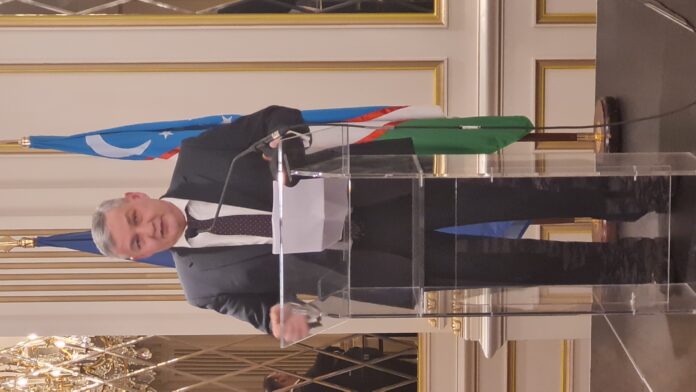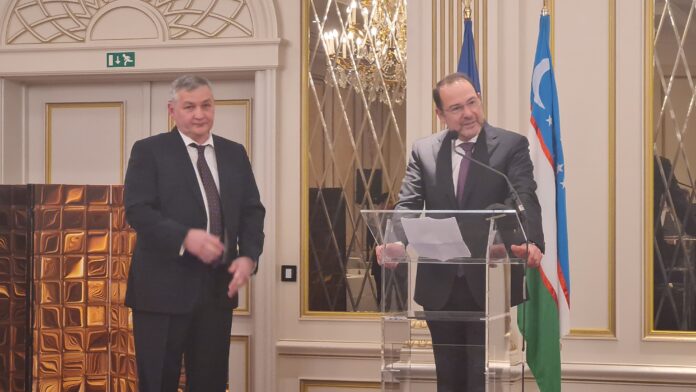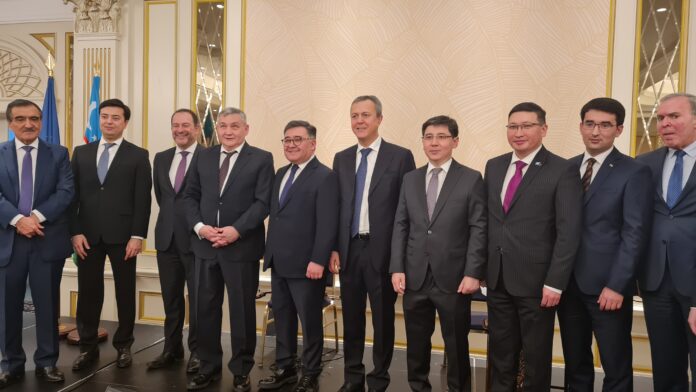By Roy Lie Atjam
Brussels, 20 February 2023, H.E. Mr Dilyor Khakimov, Ambassador of Uzbekistan to the Benelux and Head of Mission of Uzbekistan to the EU. and NATO, organized the first Uzbekistan-EU: State of the Progress.
The objective was to celebrate the state of progress in Uzbekistan-EU relations. The venue, Steigenberger Wiltcher’s Hotel.
The Uzbekistan-EU: State of the Progress, Uzbekistan Ambassadors to the EU. recounted their accomplishments. One Ambassador managed to interest universities to establish branches of their institution in Uzbekistan.

On the program, a discourse by Ambassador H.E. Mr Dilyor Khakimov. He started by saying “I am very glad to see the distinguished representatives of the European External Action Service, the European Commission, the European Council, the media, and all our friends. Special thanks to the distinguished Ambassadors of the EU Member States and their representatives.

I am glad to welcome my good friend, Luc Devigne, Deputy Managing Director for Eastern Europe and Central Asia at the EEAS.
It is very unique that at this event I am joined by my colleagues, Ambassadors of Uzbekistan to Austria – Mr. Abat Faizullaev, to Germany –
Mr. Nabijon Kasimov, to France – Mr. Sardor Rustambaev and to Italy – Mr. Otabek Akbarov, are also present here tonight.
My special thanks also for the presence of the Ambassadors of our brotherly Central Asian states (Kazakhstan, Kyrgyzstan, Tajikistan and Turkmenistan) and Azerbaijan. Today’s event is dedicated to the state of the progress made in the relations between Uzbekistan and the European Union.
During the last years, under the leadership of the H.E. President Shavkat Mirziyoyev, we are building a New Uzbekistan which regards the EU as one of its key international partner and attaches particular importance to the further development of mutually beneficial cooperation on a whole range of issues.
Uzbekistan is at an important stage of its development. The large-scale program of comprehensive reforms continues in the country, the main goal of which is the steady continuation of the process of transformation of Uzbekistan into a democratic, rule of law based state with a socially oriented market economy, ensuring comprehensive protection of the interests and rights of citizens, security, sustainable development and independence of the country.
Thanks to the democratic transformations in recent years, fundamental values have become a reality in the life of society – human rights and freedoms, rule of law, freedom of speech, freedom of religion and freedom of conscience.
A strong atmosphere of mutual respect, tolerance, peace and stability has been established in the country. The values of interethnic and interfaith friendship and brotherhood, which have been formed on the land of Uzbekistan for centuries, have been strengthened.
As far as the foreign policy is concerned, Uzbekistan carries out an open, neighborly and pragmatic course, aimed at turning Central Asia into a region of stability, security and prosperity. The priority of strengthening and expanding friendly relations and strategic partnership with all states of the world is being actively implemented. There is a unique mechanism for the development of regional cooperation – Consultative meetings of the heads of state of the region.
A historic document – Treaty on Friendship, Good-Neighborliness and Cooperation for the Development of Central Asia in the XXI Century – was signed in Kyrgyzstan during the Consultative Meeting on 21 July 2022.
Uzbekistan’s role in multilateral formats has intensified. Today, our country is taking important initiatives in the framework of the UN and other international organizations to address contemporary regional and global issues, such as promoting the settlement of the Afghan problem, climate change, Aral Sea disaster, achievement of Sustainable Development Goals, etc.
Uzbekistan held the Presidency in the Shanghai Cooperation Organization and the Economic Cooperation Organization, as well as hosted the first time the Summit of the Organization of Turkic States in 2022.
It is no exaggeration to say that 2022 became a new page in bilateral and interregional relations between Uzbekistan and the EU.
The first visit of President of the European Council Charles Michel to our country on 27-28 October 2022, as well as fruitful negotiations and significant agreements reached within the framework of the participation of President Shavkat Mirziyoyev in the first EU-Central Asia Summit on 27 October in Astana prompted the further development of our comprehensive cooperation.

The visit of EU High Representative Josep Borrell to our country on 17-19 November 2022 made it possible to once again discuss topical issues.
The EU-Central Asia Connectivity Conference organized at the initiative of Uzbekistan in Samarkand on 18 November 2022 was an important event in strengthening interregional cooperation. At the end of this event, specific agreements were reached on expansion of cooperation in digitalization, green economy, energy, climate change and transport.
The key areas of our cooperation with the EU and its member states are investments, trade, financial and technical assistance, high-tech transfer, science and technology, education, ecology, tourism, health and culture, as well as strengthening regional security.
A great achievement in our bilateral relations was the successful completion by the parties of negotiations on the Expanded Partnership and Cooperation Agreement (EPCA), as a result of which it was initialed on 6 July 2022 in Brussels.
I would like to emphasize that the main provisions of EPCA are fully in line with the Development Strategy of New Uzbekistan for 2022-2026 adopted in January 2022.
The Strategy identifies seven most important priorities for the country’s development in the coming years. They focus on human rights, strengthening civil society, ensure justice, rule of law and others.
The volume of bilateral trade turnover last year reached $4.48 billion (in 2021 – $3.79 billion). Currently, 1052 enterprises with investments from EU member states are working in our country, including 304 companies with 100 percent of European capital. In this regard, I would like to note that on 10 April 2021, Uzbekistan was granted the status of beneficiary of EU’s GSP+ scheme. This decision made it possible for about 6,200 types of goods produced in our country to enter the EU market without customs duties. Thanks to this, the export of Uzbek goods to the EU has increased significantly.
The Uzbek side is grateful to the European side for supporting Uzbekistan’s WTO accession and for providing the technical support (5 mln euros) in this direction. We are sure that this will serve to further expand trade and economic relations between Uzbekistan and the EU.
I am confident that the close friendly and constructive relations between Uzbekistan and the EU will continue to consistently strengthen and expand in the interests of our peoples.
In conclusion I will now give the floor to Mr. Luc Devigne, Deputy Managing Director for Eastern Europe and Central Asia at the EEAS, as well as to my colleagues, Ambassadors of Uzbekistan to Austria, Germany, France and Italy”
Excerpts of the speeches by the above-mentioned persons now follow.ly.
Discourse by Mr Luc Devigne(EEAS)
“Celebrating the progress we have achieved in EU-Uzbekistan relations. Next year, we will celebrate thirty years of formal diplomatic relations between the European Union and Uzbekistan. It has been my honour to be the person on the EU side responsible for this relationship for nearly one third of that time.
Uzbekistan is youthful, dynamic, and rapidly growing. It is a positive force in a region that is geopolitically more and more important. Uzbekistan is outward-looking, active in promoting regional cooperation and global solutions, and a supporter of the multilateral order and the international rule of law. Our partnership is strong and based on common values as well as common interests.
Last year, it was my honour to initial the new Enhanced Partnership and Cooperation Agreement between the EU and Uzbekistan, as the EU’s chief negotiator. We were also able to formalise the entry of Uzbekistan into the EU’s General System of Preferences Plus, nearly two years ago. As well as giving us a new platform to discuss matters of mutual interest and international governance, this has also prompted a big increase in trade between the EU and Uzbekistan, taking advantage of the removal of tariffs on around two thirds of the product lines exported to the EU from Uzbekistan. In the first year of GSP+ membership, Uzbekistan’s exports to the EU more than doubled. Imports from the EU into Uzbekistan are also growing at a record rate.
Last November’s EU-Central Asia Sustainable Connectivity Conference in Samarkand was a great success, which owed much to the energy and leadership of the host nation. It is in our common interest to build closer economic ties between the EU and Uzbekistan, to support Uzbekistan’s economic reform process and its entry into the WTO.
The global situation is a concern, we are very conscious this week of the anniversary of Russia’s invasion of Ukraine. We understand and respect Uzbekistan’s historical relationship with Russia, and the realities which this imposes. At the same time, we acknowledge Uzbekistan’s policy of balanced neutrality. As Russia’s war enters a second year, it is more important than ever that we work together to uphold international law and find international solutions which respect that law.
Europe is a partner for Uzbekistan as it continues to press forward with its reform programme. We are looking forward to seeing what will be achieved during President Mirziyoyev’s second term in office. We know that lessons will have been learnt from the events of last July in Nukus, particularly on the importance of broad, open consultation. The situation in Uzbekistan for human rights and fundamental freedoms has changed drastically for the better in the last few years, and we as your European partners wish to support you as you cement these positive changes with further reforms in the coming months and years.
Discourse by Uzbekistan Ambassador to Italy Mr Otabek Akbarov.
Uzbekistan-EU: State of the Progress. Today a stable dialogue and comprehensive cooperation in the political, economic and cultural spheres has been formed between Uzbekistan and the EU and its member countries.
We highly appreciate the new dynamics of our relations with Rome which has contributed to the intensification and expansion of cooperation in the political, trade, economic, cultural and humanitarian spheres.
We will always remember the first fundamental document with the EU, the Partnership and Cooperation Agreement, was signed with the friendly support of the Italian Presidency of the EU Council in Florence in 1996.
We highly appreciate Italy’s support in obtaining the status of a beneficiary of the GSP+ system, as well as advancing the issue of Uzbekistan’s accession to the World Trade Organization .
Central Asia is the main priority of Uzbekistan’s foreign policy, based on building good neighbourly and constructive relations with all neighbouring countries. Uzbekistan is ready to become a gateway for Italy and all of Europe to Central Asia.
The President of Uzbekistan Shavkat Mirziyoyev, speaking at the first EU-Central Asia summit on October 27, 2022. in Astana, proposed the establishment of the European Union-Central Asia Economic Cooperation Committee and the development of a strategic program to deepen trade and economic cooperation.
We are working on the creation of an Italian-Uzbek Technology Hub based on Inno Technopark Uzbekistan in Tashkent together with one of the most important conditions for building a New Uzbekistan is to improve the quality of education, taking into account advanced foreign experience.
Cooperation with Italy in this area is the most advanced among all European countries. Two branches of Italian universities are already operating in Tashkent, the Turin Polytechnic University ( 2009) and the University of Pisa (2022).
Bukhara, is planning to open a branch of the Campania University named after Luigi Vanvitelli.
Last year, the University of World Economy and Diplomacy under the Ministry of Foreign Affairs of Uzbekistan established cooperation with the leading university in Italy – the Free International University for Social Research Guido Carli(University LUISS).
There is a growing interest in Italy for the historical and cultural heritage and today’s life of Uzbekistan.
On January 10 2023 a memorandum was signed between the Culture and Arts Development Foundation of Uzbekistan and the world-famous museum Uffizi Galleries in Florence on organisation of exhibition of paintings from the collection of the State Museum of Art named after Igor Savitsky.”
The Uzbekistan-EU: State of the Progress event was followed by a reception featuring Uzbek cuisine, a national music program and a photo-handicrafts and clothing exhibition. The Gulzoda group gave a concert featuring Maqom, an ancient type of folk art in Uzbekistan. Maqom singer Munojot Yulchiyeva is an Uzbek personality in the world of Art. Noteworthy, Maqom is on the UNESCO’s List of Intangible Cultural Heritage.
The Uzbekistan-EU achievements make Uzbekistan feel a sense of pride and accomplishment !



